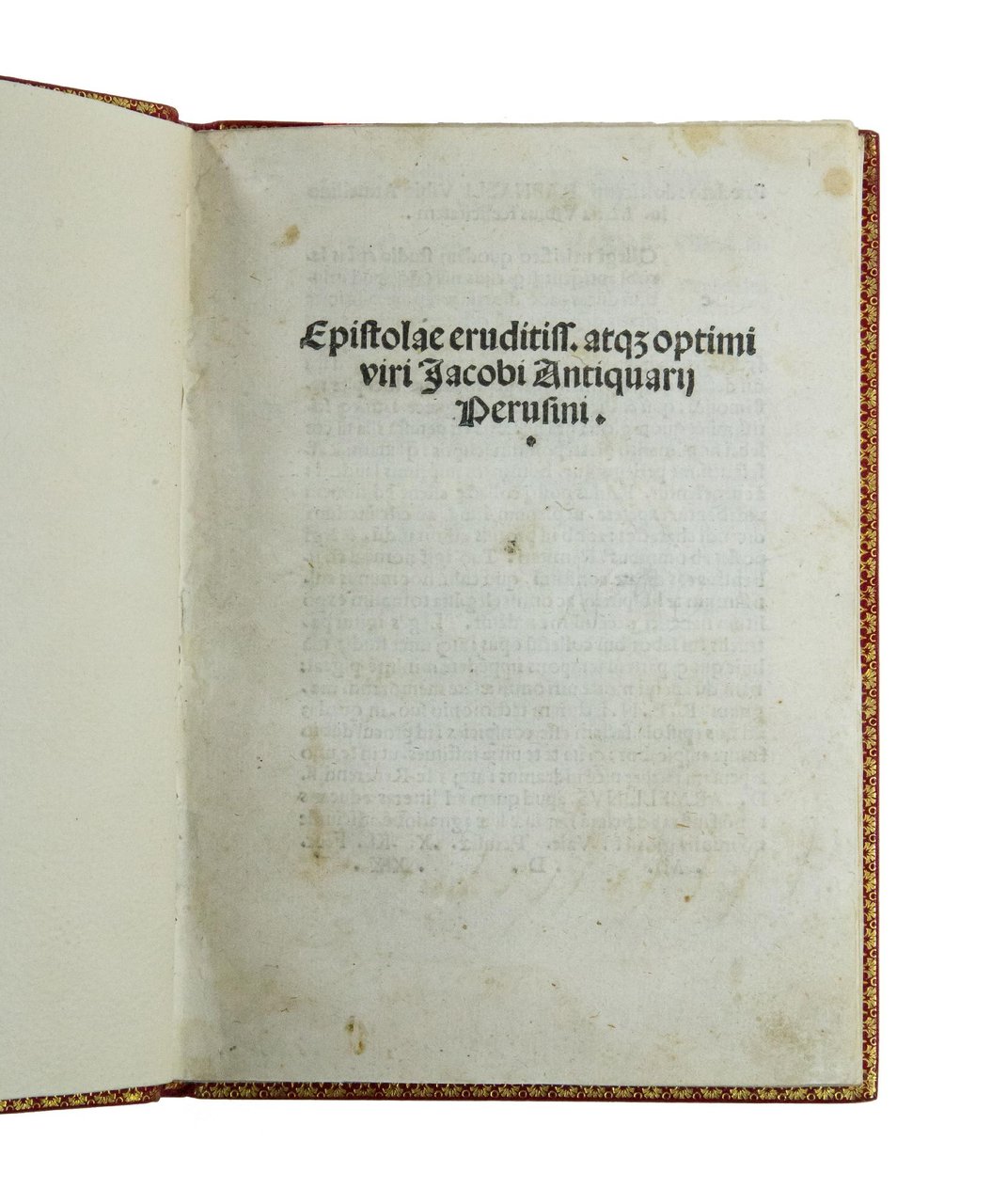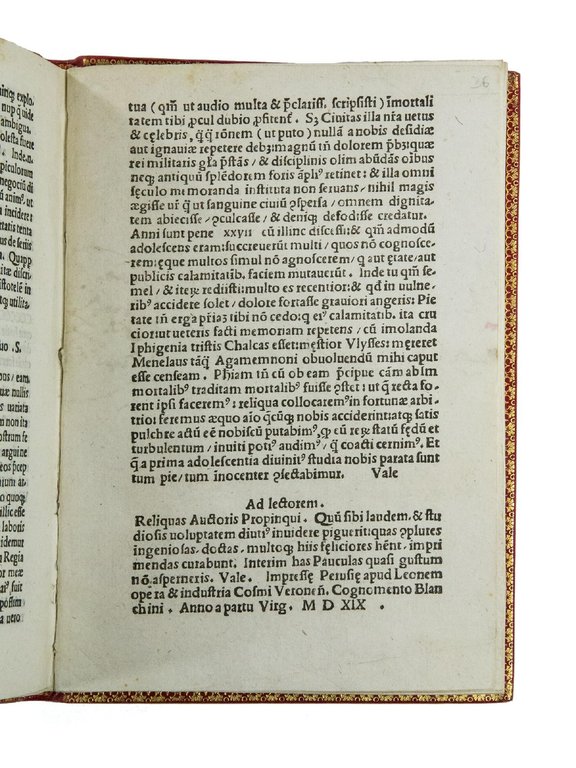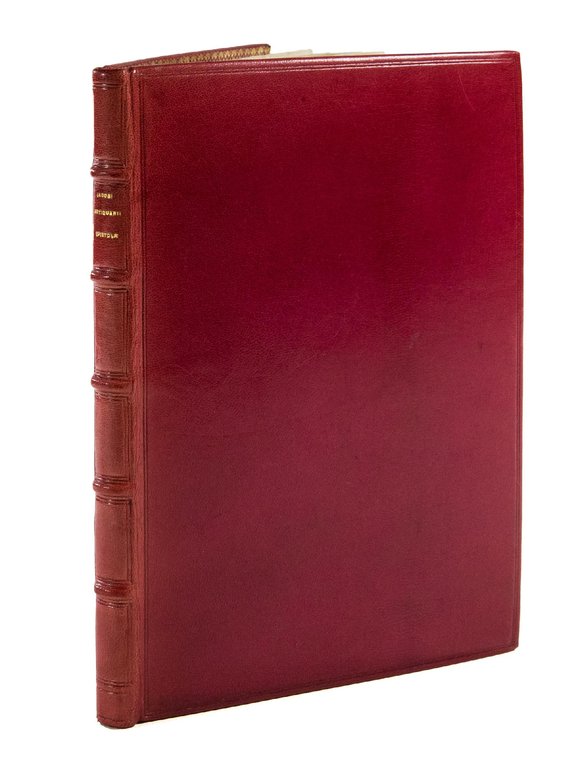


Livres anciens et modernes
ANTIQUARI, Jacopo (1444/5-1512)
Epistolae
Cosimo Bianchini, 1519
1800,00 €
Govi Libreria Antiquaria
(Modena, Italie)
Les frais d'expédition corrects sont calculés une fois que l'adresse de livraison a été indiquée lors de la création de la commande. Un ou plusieurs modes de livraison sont disponibles à la discrétion du vendeur : standard, express, economy, in store pick-up.
Conditions d'expédition de la Librairie:
Pour les articles dont le prix est supérieur à 300 euros, il est possible de demander un plan de paiement échelonné à Maremagnum. Le paiement peut être effectué avec Carta del Docente, Carta della cultura giovani e del merito, Public Administration.
Les délais de livraison sont estimés en fonction du temps d'expédition de la librairie et de la livraison par le transporteur. En cas de retenue douanière, des retards de livraison peuvent survenir. Les frais de douane éventuels sont à la charge du destinataire.
Pour plus d'informationsMode de Paiement
- PayPal
- Carte bancaire
- Virement bancaire
-
-
Découvrez comment utiliser
votre Carta del Docente -
Découvrez comment utiliser
votre Carta della cultura giovani e del merito
Détails
Description
Adams, A-1203; Edit 16, CNCE 1990; Index Aurelienis, 106.029; G.B. Vermiglioli, Bibliografia storico-perugina, o sia catalogo degli scrittori che hanno illustrato la storia della città, (Perugia, 1823), p. 11.
FIRST EDITION of this collection of letters by the ducal secretary at the Sforza court in Milan. The work was edited by Giovanni Maria Vibio and dedicated to Raffaele Vibio (see the dedicarory letter dated from Perugia, January 20, 1519). Antiquari's correspondence is a valuable source for the artistic and literary activities at the Sforza court at the turn of the fifteenth century (cf. C.M. Pyle, Milan and Lombardy in the Renaissance: Essays in Cultural History, Roma, 1997, p. 17).
(Liber primus:)
Vibio, Giovanni Maria. Milano (l. A2r)
id. Milano (l. A2r)
Vibio, Orazio. Milano (l. A2v)
Magno, Paolo (l. A3r)
id. (l. A3r)
id. Milano (l. A3v)
id. Milano (l. A4r)
id. (l. A4r)
Bartolino, Mariano (l. A4v)
Magno, Paolo. Milano (l. B1r)
Paolini, Jacopo. Milano (l. B1r)
Maturanzio, Francesco. Milano (l. B1v)
id. (l. B2r)
Ariano, Giulio (l. B2r)
Paolini, Jacopo. Milano (l. B2v)
Maturanzio, Francesco (l. B3v)
id. Milano (l. B3v)
Vibio, Giovanni Maria (l. B4v)
id. Milano (l. C1r)
Paolini, Jacopo. Milano (l. C1v)
Florenzi, Costanzo. Milano (l. C2r)
Maturanzio, Francesco (l. C2v)
id. (l. C2v)
id. (l. C3r)
id. Milano (l. C3v)
id. (l. C4r)
Vibio, Giovanni Maria (l. C4v)
id. (l. D1r)
Ferno, Michele (l. D1v)
Giuliano, A[ntonio] (l. D2r)
Baglione, Francesco (l. D2v)
Centillo (?) (l. D3v)
Vicomercati, Antonio (l. D4v)
(Liber secundus:)
Vicomercati, Antonio (l. E1r)
id. (l. E1v)
id. (l. E2r)
Paolini, Jacopo (l. E2r)
id. (l. E2r)
Vibio, Giovanni Maria (l. E2v)
Ferno, Michele (l. E3r)
id. (l. E3v)
Peragallo, Leandro (l. E4v)
Pinzoni, Agostino (l. F1r)
Vibio, Giovanni Maria (l. F1v)
id. (l. F2r)
Paolini, Jacopo (l. F2r)
id. (l. F2r)
Arrivabene, Giovanni Pietro (l. F2v)
[Giuliano], Antonio (l. F3r)
Paolini, Jacopo (l. F3r)
id. 1500 (l. F3v)
id. (l. F4r)
id. (l. F4v)
id. (l. G2r)
Ferno, Michele (l. G2v)
[Riario], Raffaele, Cardinal of San Giorgio (l. G3r)
Paolini, Jacopo (l. G3v)
Paolini, Jacopo (l. G4r)
Paolini, Jacopo (l. G4r)
[Soderini, Francesco], Cardinal Volterrano (l. G4v)
Vicomercati, Giovanni Antonio (l. G4v)
Paolini, Jacopo (l. H1r)
Giuliano, Antonio (l. H1v)
Paolini, Jacopo (l. H1v)
id. (l. H2v)
id. (l. H2v)
id. (l. H3v)
id. (l. H3v)
id. (l. H4v)
id. (l. I1r)
id. (l. I1v)
id. (l. I2r)
id. (l. I2v)
id. (l. I3r)
Vicomercati, Giovanni Antonio (l. I3r)
Maturanzio, Francesco (l. I3v)
Jacopo was probably the son of the physician Stefano Antiquari. After studying under Giovanni Antonio Campano, who taught at Perugia from 1452 to 1459, he entered the service of the papal governor of that city, Giovanni Battista Savello, and accompanied him to Bologna when he was transferred there in 1468. In the early 1470s he moved to Milan, possibly on the invitation of Bartolomeo Caldo, secretary to duke Galeazzo Maria Sforza. Antiquari served as secretary to the dukes, with supervision over appointments to ecclesiastical benefices. He chose to remain at Milan even after the French removed Lodovico (il Moro) Sforza in 1500. Antiquari was a protector, adviser, and confidant of the greatest literary figures of his day, most notably Angelo Poliziano. He is mentioned in Erasmus' Ciceronianus as one of the many writers who could not meet the exacting standards of the Ciceronians (cf. E. Bigi, Iacopo Antiquari, in: “Dizionario biografico degli italiani”, III, Roma, 1961, pp. 470-472; and more detailed G.B. Vermiglioli, Memorie di Iacopo Antiquari e degli studi di amena letteratura esercitati a Perugia nel secolo XV, Perugia, 1813, passim).

